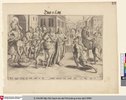
"Uriah the Hittite (Hebrew: אוּרִיָּה הַחִתִּי – ʾŪriyyāh haḥittī) is a minor figure in the Hebrew Bible, mentioned in the Books of Samuel, an elite soldier in the army of David, king of Israel and Judah, and the husband of Bathsheba, the daughter of Eliam. While Uriah was serving in David's army abroad, David himself, from the roof of his palace, looked down on his city and spied upon Bathsheba bathing in the privacy of her courtyard. Moved by lust at the sight of her, David called for her to be brought to him and slept with her, impregnating her. In an effort to hide his misdeeds, David called Uriah home from war, hoping that he and Bathsheba would have relations and that he would be able to pass the child off as belonging to Uriah. But Uriah, being a disciplined soldier, refused to visit his wife. So David murdered him by proxy by ordering all of Uriah's comrades to abandon him in the midst of battle, so that he ended up getting killed by an opposing army. Following Uriah's death, David took Bathsheba as his eighth wife." - (en.wikipedia.org 24.11.2021)
 )
)

